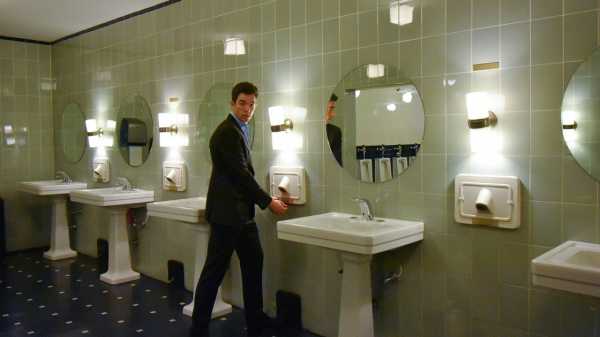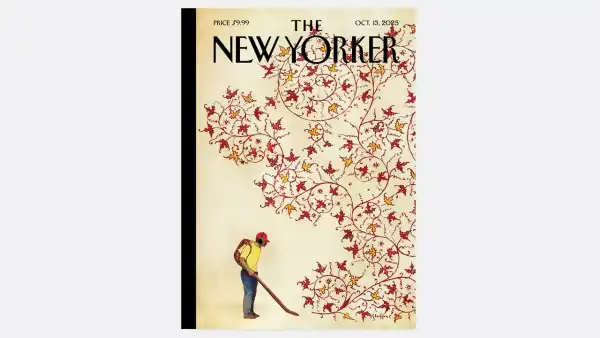
The comedian John Mulaney makes a point of thanking his audiences several times for coming to see him perform. He did it a decade ago, when the crowds were small, and does it now, in considerably larger venues, such as Radio City Music Hall, where he recorded his newest special, “Kid Gorgeous,” out this week on Netflix. “I am John Mulaney, nice to meet you,” he says, in a formal, unnecessary bit of introduction—it’s his name on on the marquee, after all. “Thank you for coming to see me.” His politeness is self-effacing and charming, but it’s also part of a stage presence—back straight, eyes wide, head tilted slightly upward to project—that calls to mind a precocious m.c. of a middle-school talent show. Indeed, Mulaney, who is thirty-five, often mocks his youthful appearance. “I was hoping that by now I would look older, but it didn’t happen,” he says, in “New in Town,” his special from 2012. When he tells audiences that he used to have a drinking problem, he seems to realize that they are likely to doubt him. “I don’t look like someone who used to do anything,” he says, and, even when he tells stories of blacking out or ruining parties or mistaking a bottle of perfume for whiskey, the tales sound less squalid than jaunty. “My wife said that walking around with me is like walking around with someone who’s running for the mayor of nothing,” he says.
Mulaney is often compared to Jerry Seinfeld, another perpetually fresh-looking and seemingly untroubled performer. In 2014, Mulaney rather boldly—and, in retrospect, perhaps brazenly—starred in a multi-camera sitcom bearing just his last name, in which he played a standup comedian living in New York. (It was hammered by critics and lasted just a season, on Fox, and the production was shuttered early.) Like Seinfeld when he broke through in the eighties, Mulaney is smart, self-assured, apparently well adjusted, and fluent in the vernacular of white middle-class American life. He is also thin, tidy, prim, and has joked about how his manner has sometimes been mistaken as gay. “I have a girlfriend now myself, which is weird because I’m probably gay based on the way I act and behave and have walked and talked for twenty-eight years,” he says in his 2012 special. (“Thin, single, and neat” was how Seinfeld once described himself in the famous episode of his sitcom when he and George Costanza were mistaken for lovers.) Mulaney’s sets are not as squeaky clean as Seinfeld’s, but he discusses corporeal matters with notable discretion. (Mulaney, who wrote for “Saturday Night Live” for four years and is a beloved figure among other comedians, writes dirtier stuff for others.) Of growing older, in the new special, he remarks only that he is frequently “damp” and, in general, “gross.”
Mulaney’s clearest kinship with Seinfeld, though, comes from the recurring role that childhood plays in his comedy. Seinfeld’s best bits have always been about the injustices of being a kid, the indignities that children are forced to sit and suffer through at the command of adults who are, to the sharp eye of the clever child, manifestly clueless, boring, and power mad. One of Seinfeld’s old bits was about being forced to go to the bank or to pick out wallpaper with his mother, his little body collapsing under the weight of boredom. “I couldn’t take childhood at a certain point,” Seinfeld jokes, in his special “Jerry Before Seinfeld.” “You get tired of it. I just couldn’t build one more balsa-wood glider.” The impetus is to grow up quickly, so that people will listen to you, at last, when you point out how ridiculous and unfair being a child is.
In “Kid Gorgeous,” Mulaney’s jokes about childhood are similarly specific and urgent, as if he is talking not about memories but instead reliving the trials of his youth, just with a grander vocabulary and a more attentive audience to hear his complaints. He recalls his “Aladdin” wallet with “blank photo laminate pages”; the disagreeable taste of orange juice after brushing your teeth; the alarming sensation of being surrounded by dads singing in church; the unfairness of having to wear the double-XL T-shirts as sleep shirts. Mulaney is deft with voices, and does a nice version of his younger self, arguing meekly with his father about his culpability in watching a classmate get bullied at school, or submitting to an odd sex talk centered on the composer Leonard Bernstein. In the animated comedy “Big Mouth,” Mulaney plays a middle schooler who earnestly and sweetly navigates the ravages of puberty, but in his standup Mulaney’s child characters are whiny, submissive, bored, and petulant, all at once.
In the special’s most expansive bit, he recalls the odd mixture of shock, impatience, and vicarious embarrassment that he and his classmates felt for the adults his school brought in to speak at assemblies—dismal puppeteers, recovering junkies, and a hard-boiled cop named Detective J. J. Bittenbinder, who used to spell out all the ways that kids might get kidnapped and what they might do to escape. Mulaney, who grew up in Chicago, speaks in a perfect accent while re-creating Bittenbinder’s set of “Street Smarts” rules for survival—including keeping cash in a money clip, busting out a taillight to wave at passersby when trapped in a trunk, or kicking your legs to throw a pedophile “off his rhythm,” all delivered to an audience of gaping third graders at nine in the morning. Standup comedy, Mulaney argues, is the closest thing in adult life to the school assembly: “Look at you all, you’re just sitting there in chairs, looking at a guy with absolutely no expertise who’s gonna talk for a while.” For his next bit, you almost expect him to ask, What’s the deal with recess?
The new special extends into the adult world, as well, with bits about Mulaney’s life with his wife in New York, about getting pestered by his undergraduate college for donations, and a funny extended metaphor about Donald Trump as a horse loose in a hospital. (In “Oh, Hello,” the two-man Broadway play he did with his frequent comedy partner Nick Kroll, Mulaney skipped middle age altogether, playing a cranky septuagenarian Upper West Sider named George St. Geegland.) Yet Mulaney seems most sure-footed when inhabiting a kid’s body with his adult brain, and the special arrives at a time well suited to receive it; the safest ground for the male comedian right now is childhood, prepubescence, a time when little boys might be confounding or annoying or even cruel, but not yet especially dangerous or explicitly predatory. “Thirteen-year-olds are the meanest people in the world,” he’s joked, but they are mean in a way that is different from how adult men, including some of the country’s most cherished male comedians, have proved themselves to be.
Still, Mulaney’s comedy of childhood is not neutered or toothless or simply nice; in it, you can see the pockets of darkness that lurk beneath the high-achiever persona. He jokes about being raised by two lawyers, with conversations taking on the tone of litigation, and says, of his parents and his upbringing, there was an icy, superficially polite, feelings-pushed-down Catholicism that has bled into his adult life. Mulaney jokes about sitting with his mother one recent Christmas, “eating Triscuits in silence.” With nothing to talk about, he takes a shot in the dark and asks her if she’d ever seen a ghost. To Mulaney’s shock, she begins telling a story about their house being haunted by a “little girl in a Victorian nightgown.” His father quickly demands that they change the subject, and, like a child, Mulaney’s imagination races to conjure some family mystery or hidden crime that his dad has been covering up for decades, which, no matter its horror, would be better than the bland truth. Wistfully, he says, “Ah, none of us really know our fathers.”
Sourse: newyorker.com






